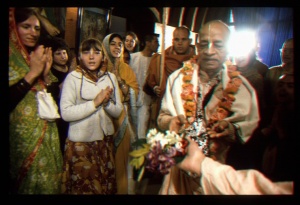CC Antya 5.71 (1975): Difference between revisions
(Vanibot #0027: CCMirror - Mirror CC's 1996 edition to form a basis for 1975) |
(Vanibot #0020: VersionCompareLinker - added a link to the Version Compare feature) |
||
| Line 2: | Line 2: | ||
<div style="float:left">'''[[Sri Caitanya-caritamrta (1975)|Śrī Caitanya-caritāmṛta (1975)]] - [[CC Antya (1975)|Antya-līlā]] - [[CC Antya 5 (1975)|Chapter 5: How Pradyumna Miśra Received Instructions from Rāmānanda Rāya]]'''</div> | <div style="float:left">'''[[Sri Caitanya-caritamrta (1975)|Śrī Caitanya-caritāmṛta (1975)]] - [[CC Antya (1975)|Antya-līlā]] - [[CC Antya 5 (1975)|Chapter 5: How Pradyumna Miśra Received Instructions from Rāmānanda Rāya]]'''</div> | ||
<div style="float:right">[[File:Go-previous.png|link=CC Antya 5.70 (1975)|Antya-līlā 5.70]] '''[[CC Antya 5.70 (1975)|Antya-līlā 5.70]] - [[CC Antya 5.72 (1975)|Antya-līlā 5.72]]''' [[File:Go-next.png|link=CC Antya 5.72 (1975)|Antya-līlā 5.72]]</div> | <div style="float:right">[[File:Go-previous.png|link=CC Antya 5.70 (1975)|Antya-līlā 5.70]] '''[[CC Antya 5.70 (1975)|Antya-līlā 5.70]] - [[CC Antya 5.72 (1975)|Antya-līlā 5.72]]''' [[File:Go-next.png|link=CC Antya 5.72 (1975)|Antya-līlā 5.72]]</div> | ||
{{CompareVersions|CC|Antya 5.71|CC 1975|CC 1996}} | |||
{{RandomImage}} | {{RandomImage}} | ||
==== TEXT 71 ==== | ==== TEXT 71 ==== | ||
| Line 11: | Line 10: | ||
<div class="verse"> | <div class="verse"> | ||
:rāmānanda rāya-kathā kahile nā haya | :rāmānanda rāya-kathā kahile nā haya | ||
: | :'manuṣya' nahe rāya, kṛṣṇa-bhakti-rasa-maya | ||
</div> | </div> | ||
| Line 25: | Line 24: | ||
<div class="translation"> | <div class="translation"> | ||
"I cannot properly describe the discourses of Rāmānanda Rāya, for he is not an ordinary human being. He is fully absorbed in the devotional service of the Lord. | |||
</div> | </div> | ||
| Line 32: | Line 31: | ||
<div class="purport"> | <div class="purport"> | ||
One is forbidden to accept the guru, or spiritual master, as an ordinary human being (guruṣu nara-matiḥ). When Rāmānanda Rāya spoke to Pradyumna Miśra, Pradyumna Miśra could understand that Rāmānanda Rāya was not an ordinary human being. A spiritually advanced person who | One is forbidden to accept the guru, or spiritual master, as an ordinary human being (guruṣu nara-matiḥ). When Rāmānanda Rāya spoke to Pradyumna Miśra, Pradyumna Miśra could understand that Rāmānanda Rāya was not an ordinary human being. A spiritually advanced person who acts with authority, as the spiritual master, speaks as the Supreme Personality of Godhead dictates from within. Thus it is not he that is personally speaking. When a pure devotee or spiritual master speaks, what he says should be accepted as having been directly spoken by the Supreme Personality of Godhead in the paramparā system. | ||
</div> | </div> | ||
Latest revision as of 02:41, 27 January 2020

A.C. Bhaktivedanta Swami Prabhupada
TEXT 71
- rāmānanda rāya-kathā kahile nā haya
- 'manuṣya' nahe rāya, kṛṣṇa-bhakti-rasa-maya
SYNONYMS
rāmānanda rāya-kathā—the speeches of Rāmānanda Rāya; kahile—describing; nā haya—is not possible; manuṣya—an ordinary human being; nahe—is not; rāya—Rāmānanda Rāya; kṛṣṇa-bhakti-rasa-maya—absorbed in the devotional service of Lord Kṛṣṇa.
TRANSLATION
"I cannot properly describe the discourses of Rāmānanda Rāya, for he is not an ordinary human being. He is fully absorbed in the devotional service of the Lord.
PURPORT
One is forbidden to accept the guru, or spiritual master, as an ordinary human being (guruṣu nara-matiḥ). When Rāmānanda Rāya spoke to Pradyumna Miśra, Pradyumna Miśra could understand that Rāmānanda Rāya was not an ordinary human being. A spiritually advanced person who acts with authority, as the spiritual master, speaks as the Supreme Personality of Godhead dictates from within. Thus it is not he that is personally speaking. When a pure devotee or spiritual master speaks, what he says should be accepted as having been directly spoken by the Supreme Personality of Godhead in the paramparā system.